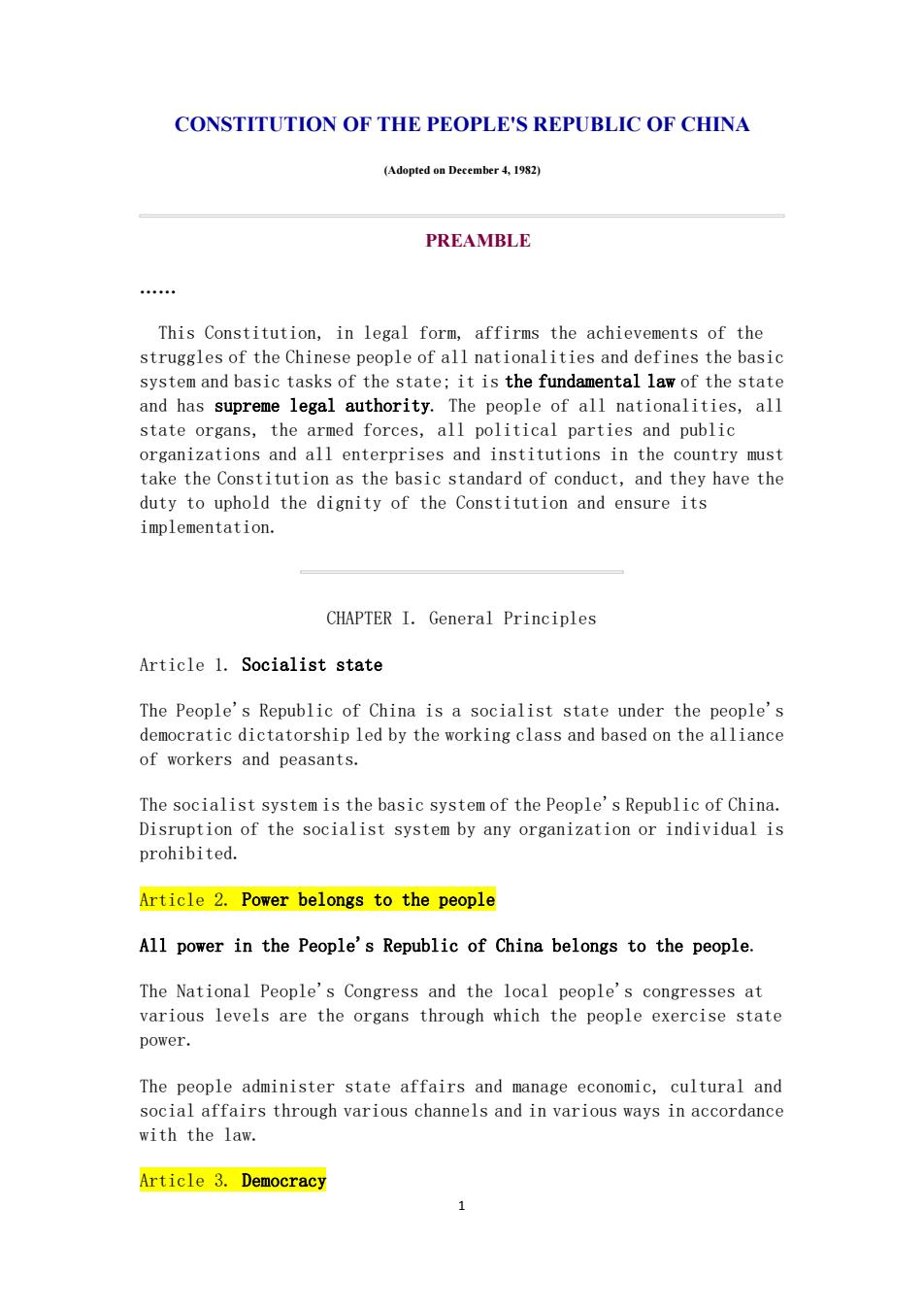
CONSTITUTION OF THE PEOPLE'S REPUBLIC OF CHINA (Adopted on December 4,1982) PREAMBLE This Constitution,in legal form,affirms the achievements of the struggles of the Chinese people of all nationalities and defines the basic system and basic tasks of the state;it is the fundamental law of the state and has supreme legal authority.The people of all nationalities,all state organs,the armed forces,all political parties and public organizations and all enterprises and institutions in the country must take the Constitution as the basic standard of conduct,and they have the duty to uphold the dignity of the Constitution and ensure its implementation. CHAPTER I.General Principles Article 1.Socialist state The People's Republic of China is a socialist state under the people's democratic dictatorship led by the working class and based on the alliance of workers and peasants. The socialist system is the basic system of the People's Republic of China. Disruption of the socialist system by any organization or individual is prohibited. Article 2.Power belongs to the people All power in the People's Republic of China belongs to the people. The National People's Congress and the local people's congresses at various levels are the organs through which the people exercise state power. The people administer state affairs and manage economic,cultural and social affairs through various channels and in various ways in accordance with the law. Article 3.Democracy
1 CONSTITUTION OF THE PEOPLE'S REPUBLIC OF CHINA (Adopted on December 4, 1982) PREAMBLE …… This Constitution, in legal form, affirms the achievements of the struggles of the Chinese people of all nationalities and defines the basic system and basic tasks of the state; it is the fundamental law of the state and has supreme legal authority. The people of all nationalities, all state organs, the armed forces, all political parties and public organizations and all enterprises and institutions in the country must take the Constitution as the basic standard of conduct, and they have the duty to uphold the dignity of the Constitution and ensure its implementation. CHAPTER I. General Principles Article 1. Socialist state The People's Republic of China is a socialist state under the people's democratic dictatorship led by the working class and based on the alliance of workers and peasants. The socialist system is the basic system of the People's Republic of China. Disruption of the socialist system by any organization or individual is prohibited. Article 2. Power belongs to the people All power in the People's Republic of China belongs to the people. The National People's Congress and the local people's congresses at various levels are the organs through which the people exercise state power. The people administer state affairs and manage economic, cultural and social affairs through various channels and in various ways in accordance with the law. Article 3. Democracy
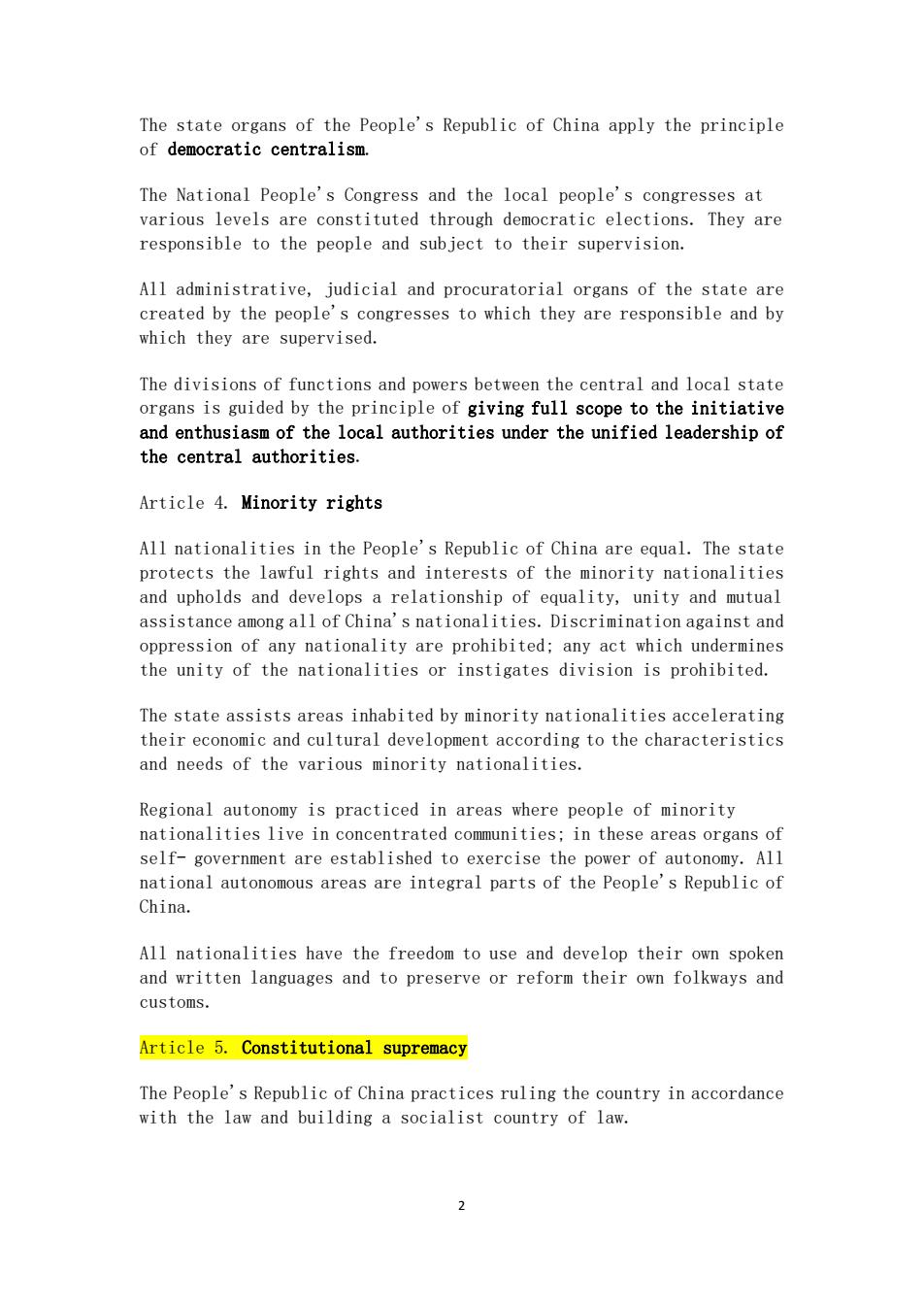
The state organs of the People's Republic of China apply the principle of democratic centralism. The National People's Congress and the local people's congresses at various levels are constituted through democratic elections.They are responsible to the people and subject to their supervision. All administrative,judicial and procuratorial organs of the state are created by the people's congresses to which they are responsible and by which they are supervised. The divisions of functions and powers between the central and local state organs is guided by the principle of giving full scope to the initiative and enthusiasm of the local authorities under the unified leadership of the central authorities. Article 4.Minority rights All nationalities in the People's Republic of China are equal.The state protects the lawful rights and interests of the minority nationalities and upholds and develops a relationship of equality,unity and mutual assistance among all of China's nationalities.Discrimination against and oppression of any nationality are prohibited;any act which undermines the unity of the nationalities or instigates division is prohibited. The state assists areas inhabited by minority nationalities accelerating their economic and cultural development according to the characteristics and needs of the various minority nationalities. Regional autonomy is practiced in areas where people of minority nationalities live in concentrated communities;in these areas organs of self-government are established to exercise the power of autonomy.All national autonomous areas are integral parts of the People's Republic of China. All nationalities have the freedom to use and develop their own spoken and written languages and to preserve or reform their own folkways and customs. Article 5.Constitutional supremacy The People's Republic of China practices ruling the country in accordance with the law and building a socialist country of law
2 The state organs of the People's Republic of China apply the principle of democratic centralism. The National People's Congress and the local people's congresses at various levels are constituted through democratic elections. They are responsible to the people and subject to their supervision. All administrative, judicial and procuratorial organs of the state are created by the people's congresses to which they are responsible and by which they are supervised. The divisions of functions and powers between the central and local state organs is guided by the principle of giving full scope to the initiative and enthusiasm of the local authorities under the unified leadership of the central authorities. Article 4. Minority rights All nationalities in the People's Republic of China are equal. The state protects the lawful rights and interests of the minority nationalities and upholds and develops a relationship of equality, unity and mutual assistance among all of China's nationalities. Discrimination against and oppression of any nationality are prohibited; any act which undermines the unity of the nationalities or instigates division is prohibited. The state assists areas inhabited by minority nationalities accelerating their economic and cultural development according to the characteristics and needs of the various minority nationalities. Regional autonomy is practiced in areas where people of minority nationalities live in concentrated communities; in these areas organs of self- government are established to exercise the power of autonomy. All national autonomous areas are integral parts of the People's Republic of China. All nationalities have the freedom to use and develop their own spoken and written languages and to preserve or reform their own folkways and customs. Article 5. Constitutional supremacy The People's Republic of China practices ruling the country in accordance with the law and building a socialist country of law
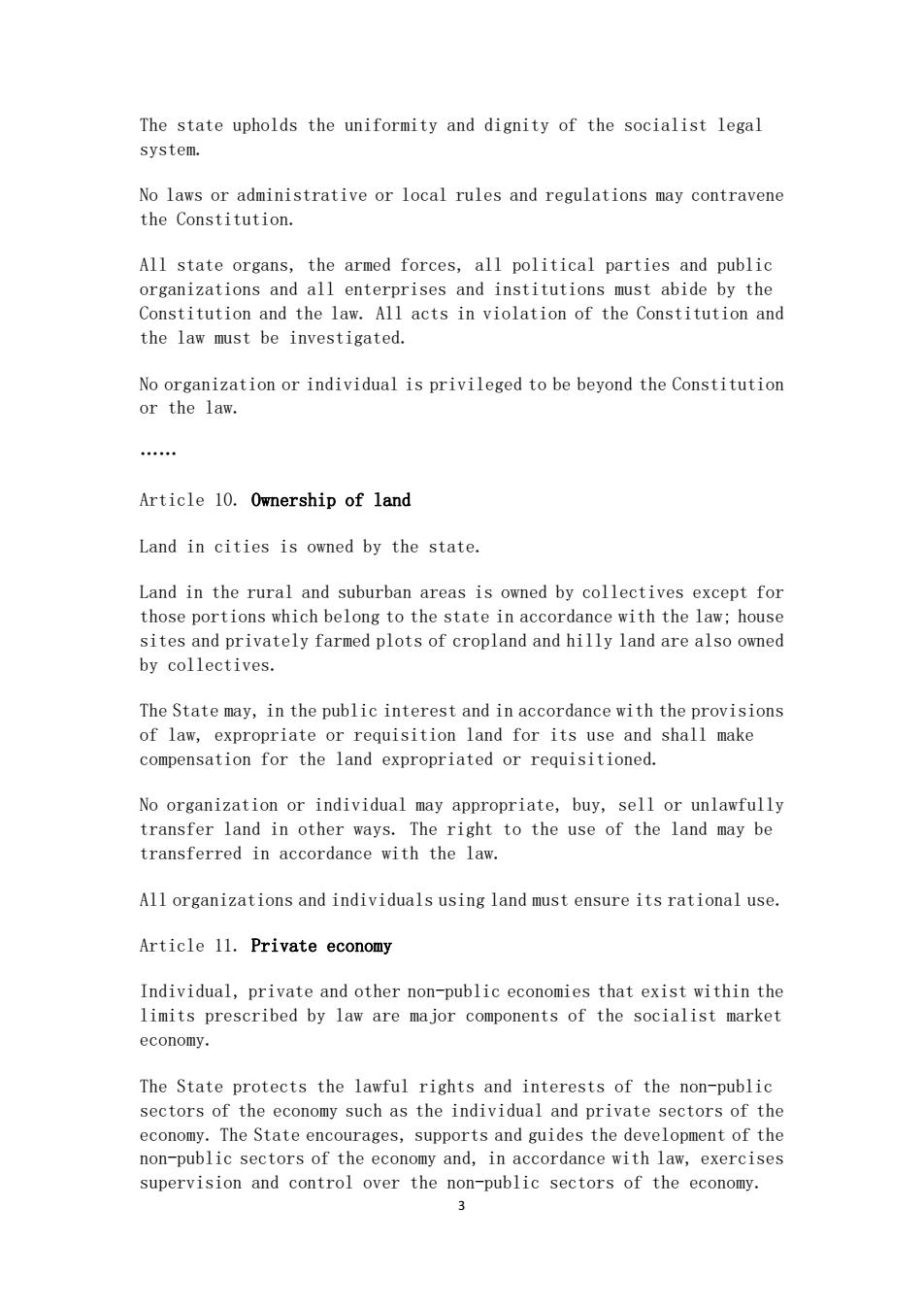
The state upholds the uniformity and dignity of the socialist legal system. No laws or administrative or local rules and regulations may contravene the Constitution. All state organs,the armed forces,all political parties and public organizations and all enterprises and institutions must abide by the Constitution and the law.All acts in violation of the Constitution and the law must be investigated. No organization or individual is privileged to be beyond the Constitution or the law. …0… Article 10.Ownership of land Land in cities is owned by the state. Land in the rural and suburban areas is owned by collectives except for those portions which belong to the state in accordance with the law;house sites and privately farmed plots of cropland and hilly land are also owned by collectives. The State may,in the public interest and in accordance with the provisions of law,expropriate or requisition land for its use and shall make compensation for the land expropriated or requisitioned. No organization or individual may appropriate,buy,sell or unlawfully transfer land in other ways.The right to the use of the land may be transferred in accordance with the law. All organizations and individuals using land must ensure its rational use. Article 11.Private economy Individual,private and other non-public economies that exist within the limits prescribed by law are major components of the socialist market economy. The State protects the lawful rights and interests of the non-public sectors of the economy such as the individual and private sectors of the economy.The State encourages,supports and guides the development of the non-public sectors of the economy and,in accordance with law,exercises supervision and control over the non-public sectors of the economy. 3
3 The state upholds the uniformity and dignity of the socialist legal system. No laws or administrative or local rules and regulations may contravene the Constitution. All state organs, the armed forces, all political parties and public organizations and all enterprises and institutions must abide by the Constitution and the law. All acts in violation of the Constitution and the law must be investigated. No organization or individual is privileged to be beyond the Constitution or the law. …… Article 10. Ownership of land Land in cities is owned by the state. Land in the rural and suburban areas is owned by collectives except for those portions which belong to the state in accordance with the law; house sites and privately farmed plots of cropland and hilly land are also owned by collectives. The State may, in the public interest and in accordance with the provisions of law, expropriate or requisition land for its use and shall make compensation for the land expropriated or requisitioned. No organization or individual may appropriate, buy, sell or unlawfully transfer land in other ways. The right to the use of the land may be transferred in accordance with the law. All organizations and individuals using land must ensure its rational use. Article 11. Private economy Individual, private and other non-public economies that exist within the limits prescribed by law are major components of the socialist market economy. The State protects the lawful rights and interests of the non-public sectors of the economy such as the individual and private sectors of the economy. The State encourages, supports and guides the development of the non-public sectors of the economy and, in accordance with law, exercises supervision and control over the non-public sectors of the economy

4… Article 13.Private property,inheritance Citizens'lawful private property is inviolable. The State,in accordance with law,protects the rights of citizens to private property and to its inheritance. The State may,in the public interest and in accordance with law, expropriate or requisition private property for its use and shall make compensation for the private property expropriated or requisitioned. Article 18.Foreign investment The People's Republic of China permits foreign enterprises,other foreign economic organizations and individual foreigners to invest in China and to enter into various forms of economic cooperation with Chinese enterprises and other Chinese economic organizations in accordance with the law of the People's Republic of China. All foreign enterprises,other foreign economic organizations as well as Chinese-foreign joint ventures within Chinese territory shall abide by the law of the People's Republic of China. … Article 25.Family planning The state promotes family planning so that population growth may fit the plans for economic and social development. Article 30.Governmental divisions The administrative division of the People's Republic of China is as follows: 1)The country is divided into provinces,autonomous regions and municipalities directly under the Central Government; 2)Provinces and autonomous regions are divided into autonomous prefectures,counties,autonomous counties,and cities; 4
4 …… Article 13. Private property, inheritance Citizens' lawful private property is inviolable. The State, in accordance with law, protects the rights of citizens to private property and to its inheritance. The State may, in the public interest and in accordance with law, expropriate or requisition private property for its use and shall make compensation for the private property expropriated or requisitioned. …… Article 18. Foreign investment The People's Republic of China permits foreign enterprises, other foreign economic organizations and individual foreigners to invest in China and to enter into various forms of economic cooperation with Chinese enterprises and other Chinese economic organizations in accordance with the law of the People's Republic of China. All foreign enterprises, other foreign economic organizations as well as Chinese-foreign joint ventures within Chinese territory shall abide by the law of the People's Republic of China. …… Article 25. Family planning The state promotes family planning so that population growth may fit the plans for economic and social development. …… Article 30. Governmental divisions The administrative division of the People's Republic of China is as follows: 1)The country is divided into provinces, autonomous regions and municipalities directly under the Central Government; 2)Provinces and autonomous regions are divided into autonomous prefectures, counties, autonomous counties, and cities;
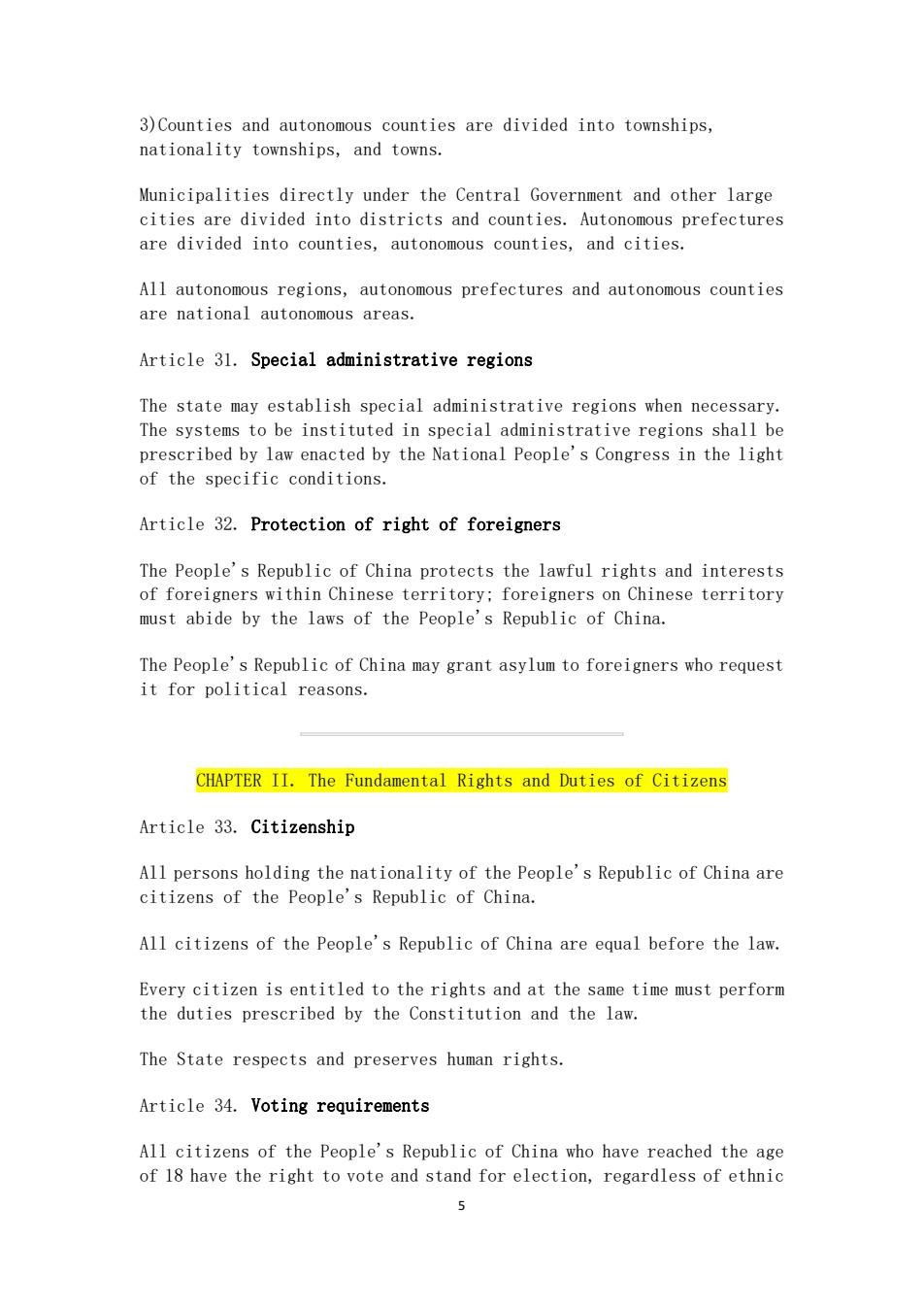
3)Counties and autonomous counties are divided into townships, nationality townships,and towns. Municipalities directly under the Central Government and other large cities are divided into districts and counties.Autonomous prefectures are divided into counties,autonomous counties,and cities. All autonomous regions,autonomous prefectures and autonomous counties are national autonomous areas. Article 31.Special administrative regions The state may establish special administrative regions when necessary. The systems to be instituted in special administrative regions shall be prescribed by law enacted by the National People's Congress in the light of the specific conditions. Article 32.Protection of right of foreigners The People's Republic of China protects the lawful rights and interests of foreigners within Chinese territory;foreigners on Chinese territory must abide by the laws of the People's Republic of China. The People's Republic of China may grant asylum to foreigners who request it for political reasons. CHAPTER II.The Fundamental Rights and Duties of Citizens Article 33.Citizenship All persons holding the nationality of the People's Republic of China are citizens of the People's Republic of China. All citizens of the People's Republic of China are equal before the law. Every citizen is entitled to the rights and at the same time must perform the duties prescribed by the Constitution and the law. The State respects and preserves human rights. Article 34.Voting requirements All citizens of the People's Republic of China who have reached the age of 18 have the right to vote and stand for election,regardless of ethnic 5
5 3)Counties and autonomous counties are divided into townships, nationality townships, and towns. Municipalities directly under the Central Government and other large cities are divided into districts and counties. Autonomous prefectures are divided into counties, autonomous counties, and cities. All autonomous regions, autonomous prefectures and autonomous counties are national autonomous areas. Article 31. Special administrative regions The state may establish special administrative regions when necessary. The systems to be instituted in special administrative regions shall be prescribed by law enacted by the National People's Congress in the light of the specific conditions. Article 32. Protection of right of foreigners The People's Republic of China protects the lawful rights and interests of foreigners within Chinese territory; foreigners on Chinese territory must abide by the laws of the People's Republic of China. The People's Republic of China may grant asylum to foreigners who request it for political reasons. CHAPTER II. The Fundamental Rights and Duties of Citizens Article 33. Citizenship All persons holding the nationality of the People's Republic of China are citizens of the People's Republic of China. All citizens of the People's Republic of China are equal before the law. Every citizen is entitled to the rights and at the same time must perform the duties prescribed by the Constitution and the law. The State respects and preserves human rights. Article 34. Voting requirements All citizens of the People's Republic of China who have reached the age of 18 have the right to vote and stand for election, regardless of ethnic
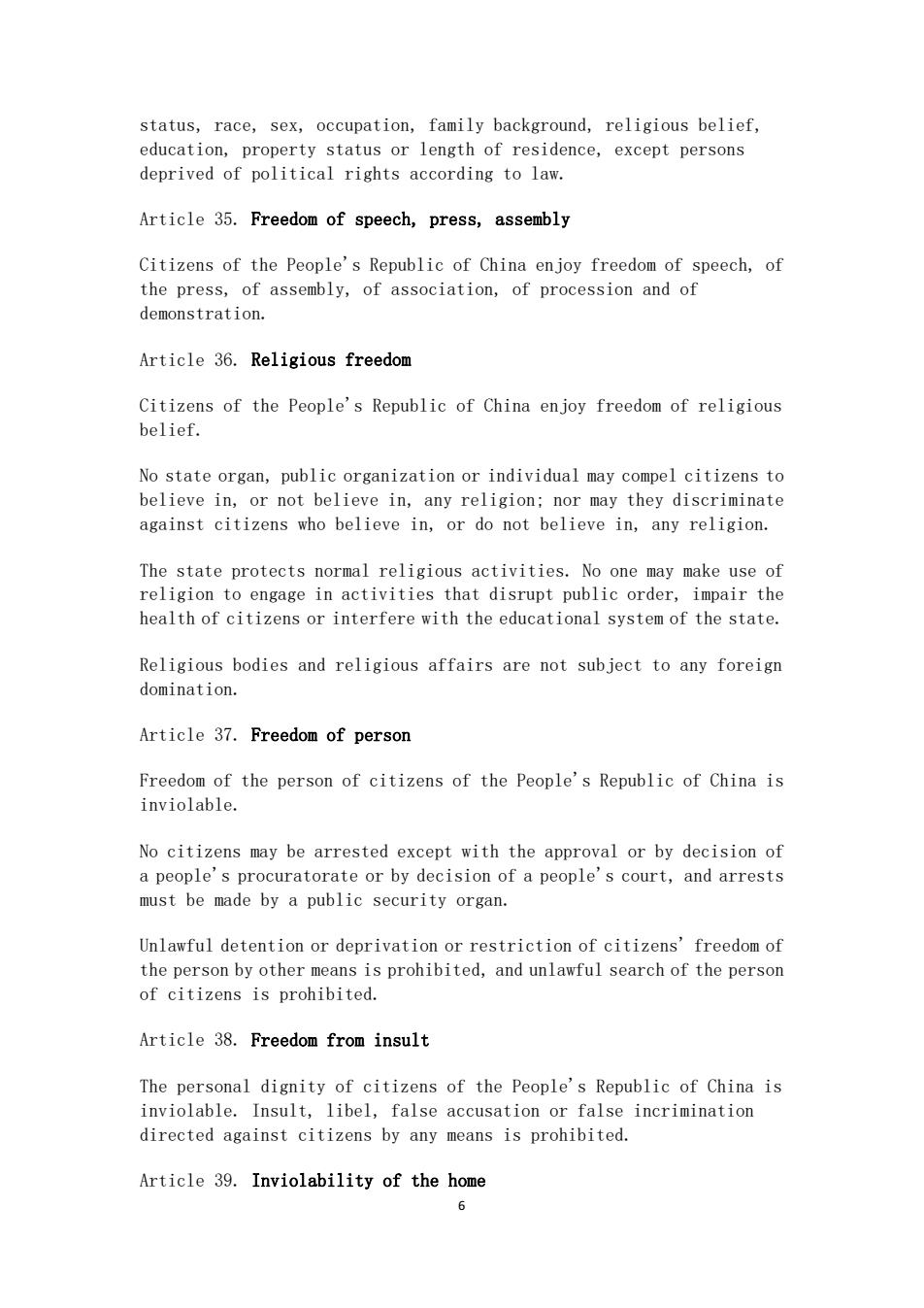
status,race,sex,occupation,family background,religious belief, education,property status or length of residence,except persons deprived of political rights according to law. Article 35.Freedom of speech,press,assembly Citizens of the People's Republic of China enjoy freedom of speech,of the press,of assembly,of association,of procession and of demonstration. Article 36.Religious freedom Citizens of the People's Republic of China enjoy freedom of religious belief. No state organ,public organization or individual may compel citizens to believe in,or not believe in,any religion;nor may they discriminate against citizens who believe in,or do not believe in,any religion. The state protects normal religious activities.No one may make use of religion to engage in activities that disrupt public order,impair the health of citizens or interfere with the educational system of the state. Religious bodies and religious affairs are not subject to any foreign domination. Article 37.Freedom of person Freedom of the person of citizens of the People's Republic of China is inviolable. No citizens may be arrested except with the approval or by decision of a people's procuratorate or by decision of a people's court,and arrests must be made by a public security organ. Unlawful detention or deprivation or restriction of citizens'freedom of the person by other means is prohibited,and unlawful search of the person of citizens is prohibited. Article 38.Freedom from insult The personal dignity of citizens of the People's Republic of China is inviolable.Insult,libel,false accusation or false incrimination directed against citizens by any means is prohibited. Article 39.Inviolability of the home 6
6 status, race, sex, occupation, family background, religious belief, education, property status or length of residence, except persons deprived of political rights according to law. Article 35. Freedom of speech, press, assembly Citizens of the People's Republic of China enjoy freedom of speech, of the press, of assembly, of association, of procession and of demonstration. Article 36. Religious freedom Citizens of the People's Republic of China enjoy freedom of religious belief. No state organ, public organization or individual may compel citizens to believe in, or not believe in, any religion; nor may they discriminate against citizens who believe in, or do not believe in, any religion. The state protects normal religious activities. No one may make use of religion to engage in activities that disrupt public order, impair the health of citizens or interfere with the educational system of the state. Religious bodies and religious affairs are not subject to any foreign domination. Article 37. Freedom of person Freedom of the person of citizens of the People's Republic of China is inviolable. No citizens may be arrested except with the approval or by decision of a people's procuratorate or by decision of a people's court, and arrests must be made by a public security organ. Unlawful detention or deprivation or restriction of citizens' freedom of the person by other means is prohibited, and unlawful search of the person of citizens is prohibited. Article 38. Freedom from insult The personal dignity of citizens of the People's Republic of China is inviolable. Insult, libel, false accusation or false incrimination directed against citizens by any means is prohibited. Article 39. Inviolability of the home
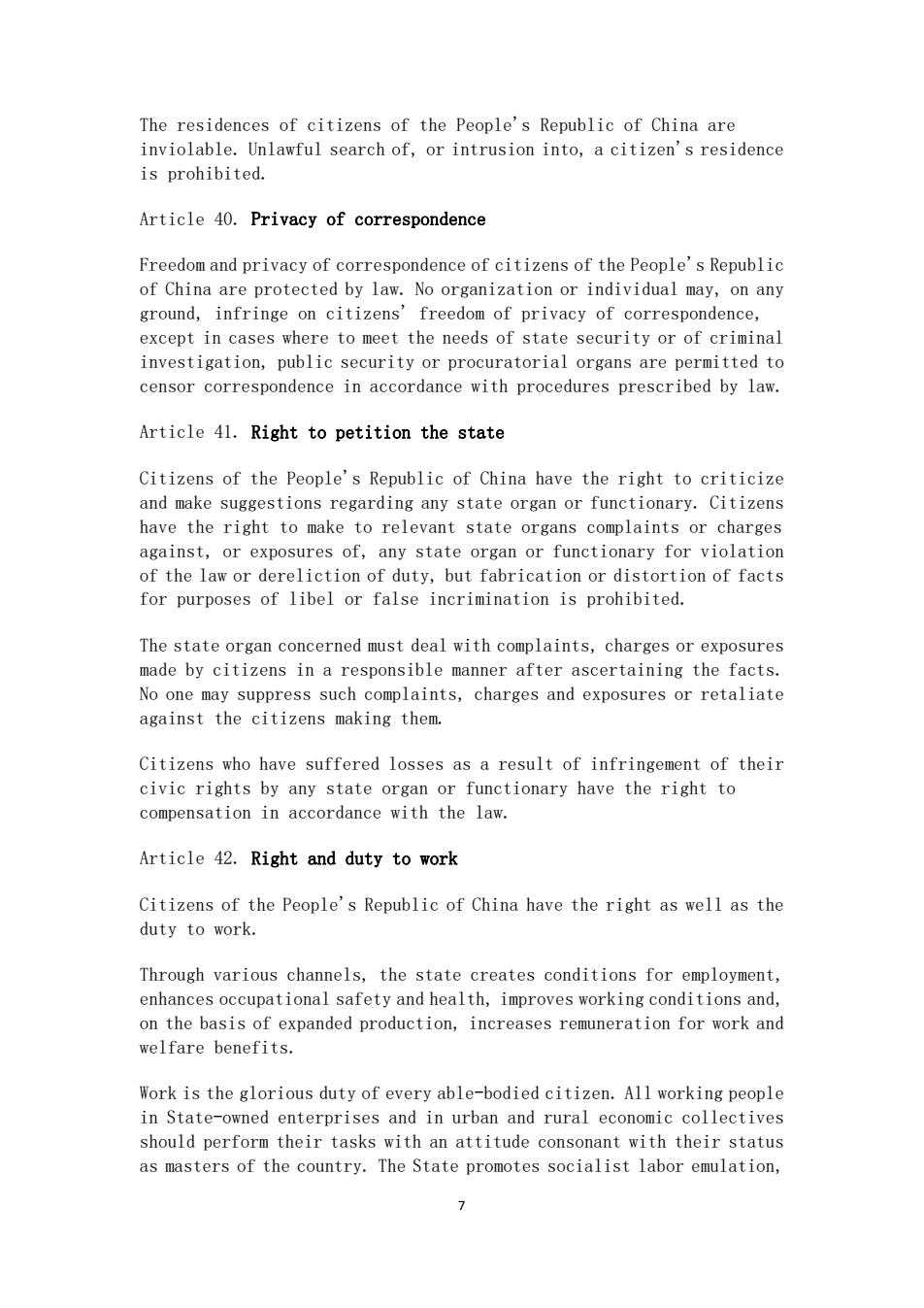
The residences of citizens of the People's Republic of China are inviolable.Unlawful search of,or intrusion into,a citizen's residence is prohibited. Article 40.Privacy of correspondence Freedom and privacy of correspondence of citizens of the People's Republic of China are protected by law.No organization or individual may,on any ground,infringe on citizens'freedom of privacy of correspondence, except in cases where to meet the needs of state security or of criminal investigation,public security or procuratorial organs are permitted to censor correspondence in accordance with procedures prescribed by law. Article 41.Right to petition the state Citizens of the People's Republic of China have the right to criticize and make suggestions regarding any state organ or functionary.Citizens have the right to make to relevant state organs complaints or charges against,or exposures of,any state organ or functionary for violation of the law or dereliction of duty,but fabrication or distortion of facts for purposes of libel or false incrimination is prohibited. The state organ concerned must deal with complaints,charges or exposures made by citizens in a responsible manner after ascertaining the facts. No one may suppress such complaints,charges and exposures or retaliate against the citizens making them. Citizens who have suffered losses as a result of infringement of their civic rights by any state organ or functionary have the right to compensation in accordance with the law. Article 42.Right and duty to work Citizens of the People's Republic of China have the right as well as the duty to work. Through various channels,the state creates conditions for employment, enhances occupational safety and health,improves working conditions and, on the basis of expanded production,increases remuneration for work and welfare benefits. Work is the glorious duty of every able-bodied citizen.All working people in State-owned enterprises and in urban and rural economic collectives should perform their tasks with an attitude consonant with their status as masters of the country.The State promotes socialist labor emulation
7 The residences of citizens of the People's Republic of China are inviolable. Unlawful search of, or intrusion into, a citizen's residence is prohibited. Article 40. Privacy of correspondence Freedom and privacy of correspondence of citizens of the People's Republic of China are protected by law. No organization or individual may, on any ground, infringe on citizens' freedom of privacy of correspondence, except in cases where to meet the needs of state security or of criminal investigation, public security or procuratorial organs are permitted to censor correspondence in accordance with procedures prescribed by law. Article 41. Right to petition the state Citizens of the People's Republic of China have the right to criticize and make suggestions regarding any state organ or functionary. Citizens have the right to make to relevant state organs complaints or charges against, or exposures of, any state organ or functionary for violation of the law or dereliction of duty, but fabrication or distortion of facts for purposes of libel or false incrimination is prohibited. The state organ concerned must deal with complaints, charges or exposures made by citizens in a responsible manner after ascertaining the facts. No one may suppress such complaints, charges and exposures or retaliate against the citizens making them. Citizens who have suffered losses as a result of infringement of their civic rights by any state organ or functionary have the right to compensation in accordance with the law. Article 42. Right and duty to work Citizens of the People's Republic of China have the right as well as the duty to work. Through various channels, the state creates conditions for employment, enhances occupational safety and health, improves working conditions and, on the basis of expanded production, increases remuneration for work and welfare benefits. Work is the glorious duty of every able-bodied citizen. All working people in State-owned enterprises and in urban and rural economic collectives should perform their tasks with an attitude consonant with their status as masters of the country. The State promotes socialist labor emulation
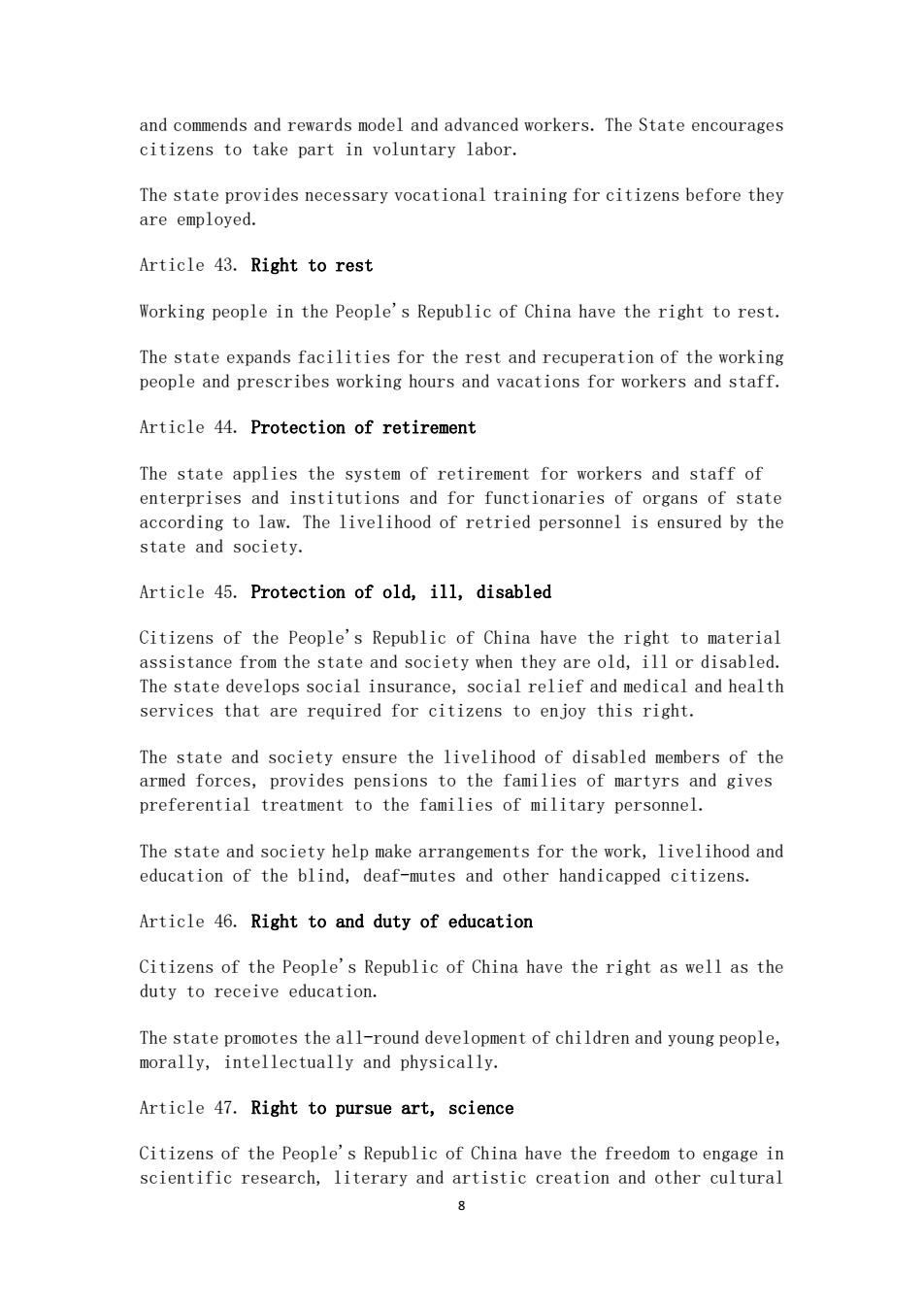
and commends and rewards model and advanced workers.The State encourages citizens to take part in voluntary labor. The state provides necessary vocational training for citizens before they are employed. Article 43.Right to rest Working people in the People's Republic of China have the right to rest. The state expands facilities for the rest and recuperation of the working people and prescribes working hours and vacations for workers and staff. Article 44.Protection of retirement The state applies the system of retirement for workers and staff of enterprises and institutions and for functionaries of organs of state according to law.The livelihood of retried personnel is ensured by the state and society. Article 45.Protection of old,ill,disabled Citizens of the People's Republic of China have the right to material assistance from the state and society when they are old,ill or disabled. The state develops social insurance,social relief and medical and health services that are required for citizens to enjoy this right. The state and society ensure the livelihood of disabled members of the armed forces,provides pensions to the families of martyrs and gives preferential treatment to the families of military personnel. The state and society help make arrangements for the work,livelihood and education of the blind,deaf-mutes and other handicapped citizens. Article 46.Right to and duty of education Citizens of the People's Republic of China have the right as well as the duty to receive education. The state promotes the all-round development of children and young people, morally,intellectually and physically. Article 47.Right to pursue art,science Citizens of the People's Republic of China have the freedom to engage in scientific research,literary and artistic creation and other cultural 8
8 and commends and rewards model and advanced workers. The State encourages citizens to take part in voluntary labor. The state provides necessary vocational training for citizens before they are employed. Article 43. Right to rest Working people in the People's Republic of China have the right to rest. The state expands facilities for the rest and recuperation of the working people and prescribes working hours and vacations for workers and staff. Article 44. Protection of retirement The state applies the system of retirement for workers and staff of enterprises and institutions and for functionaries of organs of state according to law. The livelihood of retried personnel is ensured by the state and society. Article 45. Protection of old, ill, disabled Citizens of the People's Republic of China have the right to material assistance from the state and society when they are old, ill or disabled. The state develops social insurance, social relief and medical and health services that are required for citizens to enjoy this right. The state and society ensure the livelihood of disabled members of the armed forces, provides pensions to the families of martyrs and gives preferential treatment to the families of military personnel. The state and society help make arrangements for the work, livelihood and education of the blind, deaf-mutes and other handicapped citizens. Article 46. Right to and duty of education Citizens of the People's Republic of China have the right as well as the duty to receive education. The state promotes the all-round development of children and young people, morally, intellectually and physically. Article 47. Right to pursue art, science Citizens of the People's Republic of China have the freedom to engage in scientific research, literary and artistic creation and other cultural
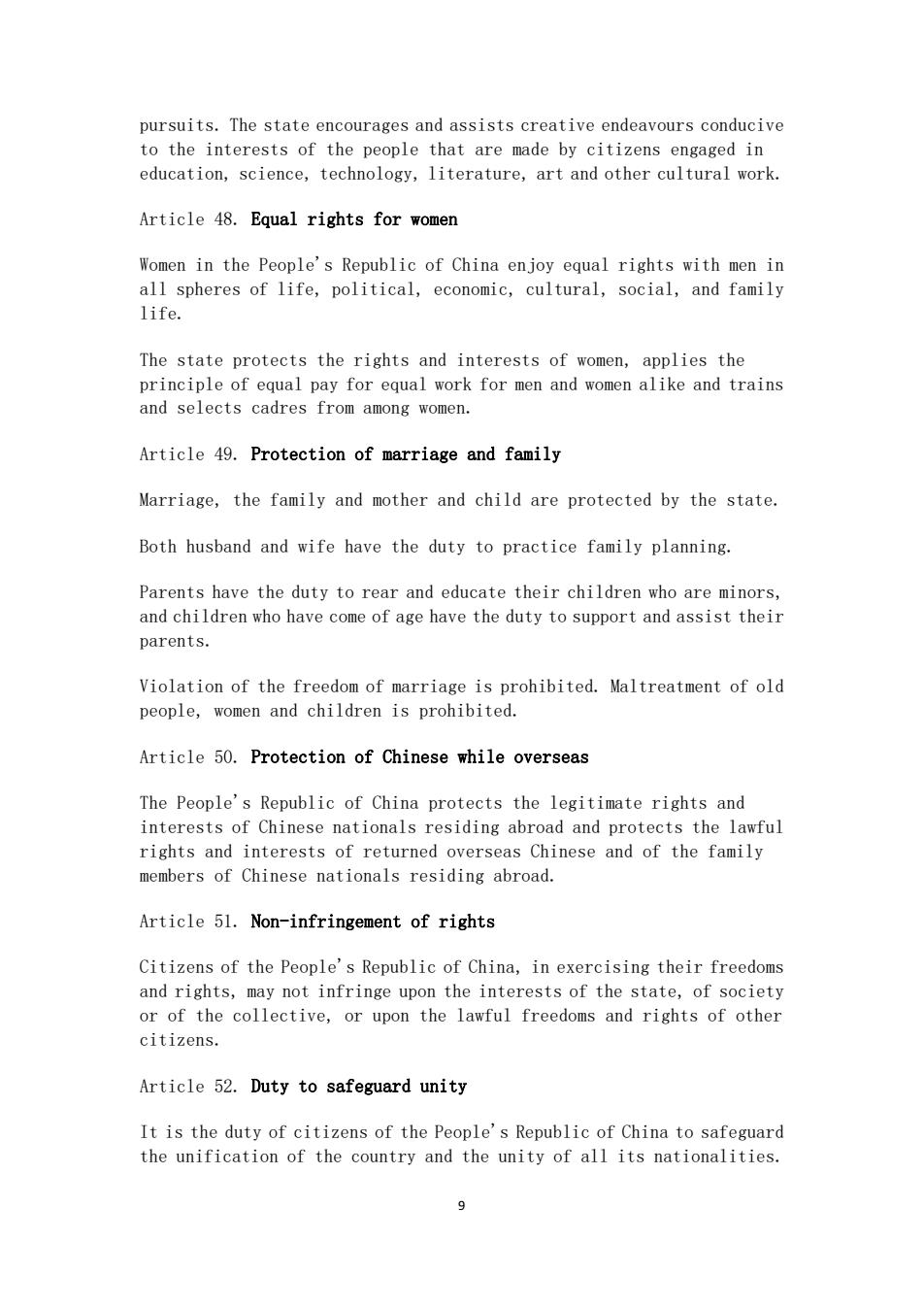
pursuits.The state encourages and assists creative endeavours conducive to the interests of the people that are made by citizens engaged in education,science,technology,literature,art and other cultural work. Article 48.Equal rights for women Women in the People's Republic of China enjoy equal rights with men in all spheres of life,political,economic,cultural,social,and family life. The state protects the rights and interests of women,applies the principle of equal pay for equal work for men and women alike and trains and selects cadres from among women. Article 49.Protection of marriage and family Marriage,the family and mother and child are protected by the state. Both husband and wife have the duty to practice family planning. Parents have the duty to rear and educate their children who are minors, and children who have come of age have the duty to support and assist their parents. Violation of the freedom of marriage is prohibited.Maltreatment of old people,women and children is prohibited. Article 50.Protection of Chinese while overseas The People's Republic of China protects the legitimate rights and interests of Chinese nationals residing abroad and protects the lawful rights and interests of returned overseas Chinese and of the family members of Chinese nationals residing abroad. Article 51.Non-infringement of rights Citizens of the People's Republic of China,in exercising their freedoms and rights,may not infringe upon the interests of the state,of society or of the collective,or upon the lawful freedoms and rights of other citizens. Article 52.Duty to safeguard unity It is the duty of citizens of the People's Republic of China to safeguard the unification of the country and the unity of all its nationalities. 9
9 pursuits. The state encourages and assists creative endeavours conducive to the interests of the people that are made by citizens engaged in education, science, technology, literature, art and other cultural work. Article 48. Equal rights for women Women in the People's Republic of China enjoy equal rights with men in all spheres of life, political, economic, cultural, social, and family life. The state protects the rights and interests of women, applies the principle of equal pay for equal work for men and women alike and trains and selects cadres from among women. Article 49. Protection of marriage and family Marriage, the family and mother and child are protected by the state. Both husband and wife have the duty to practice family planning. Parents have the duty to rear and educate their children who are minors, and children who have come of age have the duty to support and assist their parents. Violation of the freedom of marriage is prohibited. Maltreatment of old people, women and children is prohibited. Article 50. Protection of Chinese while overseas The People's Republic of China protects the legitimate rights and interests of Chinese nationals residing abroad and protects the lawful rights and interests of returned overseas Chinese and of the family members of Chinese nationals residing abroad. Article 51. Non-infringement of rights Citizens of the People's Republic of China, in exercising their freedoms and rights, may not infringe upon the interests of the state, of society or of the collective, or upon the lawful freedoms and rights of other citizens. Article 52. Duty to safeguard unity It is the duty of citizens of the People's Republic of China to safeguard the unification of the country and the unity of all its nationalities
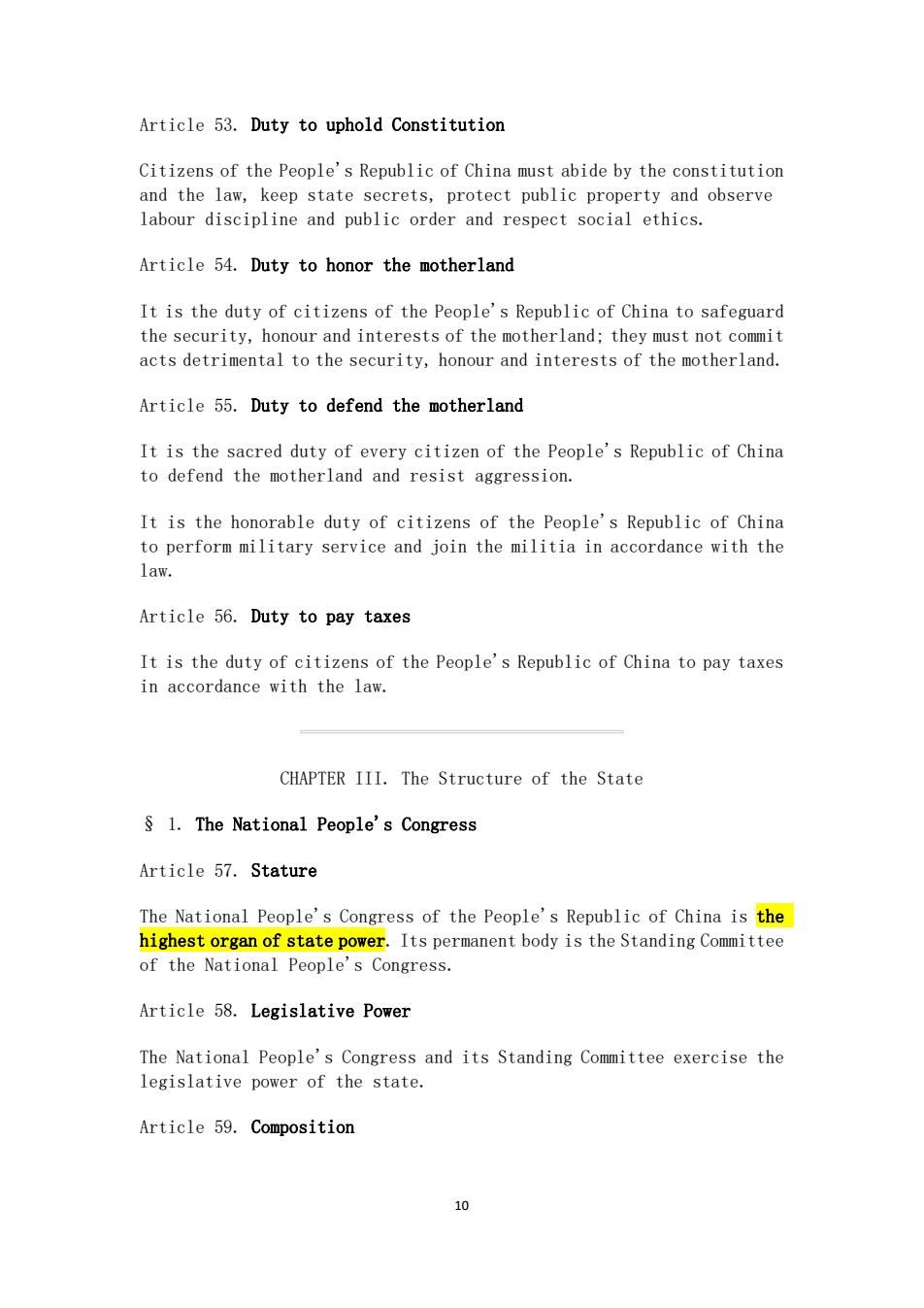
Article 53.Duty to uphold Constitution Citizens of the People's Republic of China must abide by the constitution and the law,keep state secrets,protect public property and observe labour discipline and public order and respect social ethics. Article 54.Duty to honor the motherland It is the duty of citizens of the People's Republic of China to safeguard the security,honour and interests of the motherland;they must not commit acts detrimental to the security,honour and interests of the motherland. Article 55.Duty to defend the motherland It is the sacred duty of every citizen of the People's Republic of China to defend the motherland and resist aggression. It is the honorable duty of citizens of the People's Republic of China to perform military service and join the militia in accordance with the law. Article 56.Duty to pay taxes It is the duty of citizens of the People's Republic of China to pay taxes in accordance with the law. CHAPTER III.The Structure of the State S 1.The National People's Congress Article 57.Stature The National People's Congress of the People's Republic of China is the highest organ of state power.Its permanent body is the Standing Committee of the National People's Congress. Article 58.Legislative Power The National People's Congress and its Standing Committee exercise the legislative power of the state. Article 59.Composition 9
10 Article 53. Duty to uphold Constitution Citizens of the People's Republic of China must abide by the constitution and the law, keep state secrets, protect public property and observe labour discipline and public order and respect social ethics. Article 54. Duty to honor the motherland It is the duty of citizens of the People's Republic of China to safeguard the security, honour and interests of the motherland; they must not commit acts detrimental to the security, honour and interests of the motherland. Article 55. Duty to defend the motherland It is the sacred duty of every citizen of the People's Republic of China to defend the motherland and resist aggression. It is the honorable duty of citizens of the People's Republic of China to perform military service and join the militia in accordance with the law. Article 56. Duty to pay taxes It is the duty of citizens of the People's Republic of China to pay taxes in accordance with the law. CHAPTER III. The Structure of the State § 1. The National People's Congress Article 57. Stature The National People's Congress of the People's Republic of China is the highest organ of state power. Its permanent body is the Standing Committee of the National People's Congress. Article 58. Legislative Power The National People's Congress and its Standing Committee exercise the legislative power of the state. Article 59. Composition